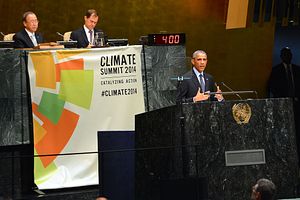One of the highlights from the recent U.S.-China summit in Beijing was an agreement on efforts to battle climate change. China pledged to reach peak emissions by 2030, the first time the Chinese government has formally committed to an emissions cap. Beijing also set an ambitious goal of having 20 percent of China’s energy come from non-fossil fuel sources by 2030. Meanwhile, the U.S. pledged to cut U.S. emissions to 26-28 percent below 2005 levels by 2025.
The general consensus regarding the deal was summed up by Rajendra Pachauri, chair of the UN’s Intergovernmental Panel on Climate Change, in comments to Reuters. “This is a good beginning,” Pachuria said, but it is not enough to prevent catastrophic climate change. Experts speaking to the New York Times emphasize the importance of China reaching peak emissions before 2030. Having emissions peak in 2025 would be a substantially more ambitious goal, but would be a crucial step in preventing global temperatures from rising by 2 degrees Celsius, the cut-off experts have chosen for preventing the worst effects of global warming.
While there’s certainly more that China (and the U.S., for that matter) can do, this deal signals an important shift in China’s approach to the problem of climate change. Previously, Beijing had refused to consider any concrete targets for emissions reductions because of its positions that the developed world should shoulder most of the responsibility for preventing climate change. In other words, Beijing prioritized continued growth over environmental protection (a common position, it must be said, among many governments around the world).
So what changed? Most notably, domestic factors in China are forcing Beijing to take environmental issues more seriously. Growing public concern over air, soil, and water pollution is a leading factor in protests in China, something the government is always keen to avoid. Public sentiment is helping to drive Beijing’s “war on pollution.” Environmental protection efforts at home fit in well with global calls for China, as the world’s leading emitter of greenhouse gases, to do more in the fight against climate change.
After the Copenhagen climate change conference in 2009, foreign media heaped the blame on China for stonewalling efforts to implement targets for absolute emissions reductions. Beijing resented the negative publicity and complained that the U.S. had unfairly shifted the blame onto China’s shoulders. Beijing is eager to avoid a repeat of that scenario in the run-up to the Paris climate change conference in 2015, another factor motivating Chinese movement on the climate change front. As Foreign Ministry spokesperson Hong Lei explained, in reaching its agreement with the U.S., Beijing wants to signal that “China is firm in resolve and strong in actions when it comes to combating climate change.”
But even while pundits debates the merits of China’s commitments, the United States’ side of the deal is in immediate jeopardy. Less than a day after the joint announcement, Republican lawmakers indicated that they will not support Obama’s pledge, as the Washington Post reported. Soon-to-be Senate majority leader Mitch McConnell called the deal “unrealistic” and said it would lead to “higher utility rates and far fewer jobs” while requiring “the Chinese to do nothing at all for 16 years.” House Speaker John Boehner denounced “the president’s crusade against affordable, reliable energy.” Boehner said that House Republicans would prioritize blocking Obama’s preferred energy policies for the rest of the president’s term.
Republicans in Congress cannot outright kill the deal, but they can hamstring the Environmental Protection Agency’s ability to enforce restrictions on greenhouse gas emissions, potentially rendering Obama’s energy guidelines toothless. Even if Congress cooperates, the U.S. would need buy-in from the next president (and possibly the next two presidents, if the 2020 election doesn’t lead to a re-election) to ensure the emissions reductions targets can be met.
The issue of credibility is crucial. The failure to reach climate change agreements in the past was motivated in part by China’s suspicion that U.S. presidents could not enact their promised policies. Beijing was unwilling to take on aggressive targets with no guarantee that the White House could convince Congress to pass similar policies. The failure to pass a deal in Copenhagen was motivated in part by China’s sense that Obama would not be able to pass legislation to back up his promises – a prediction that turned out to be true. Should the U.S. Congress, as promised, pull the rug out from under the U.S. pledge made this week, it would severely hinder future U.S.-China cooperation on climate change.
The deal reached on Tuesday is not perfect, but it is a substantial step up from previous commitments. As James Fallows of The Atlantic put it,” To have looked at either the numbers or the politics of global climate issues is to recognize that unless China and the U.S. cooperate, there is no hope for anyone else.” The U.S. and China have pledged to cooperate, but it may not be enough. While some are pushing for China to do more than promised, the real challenge may be getting Washington to do anything at all.

































